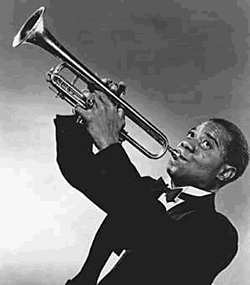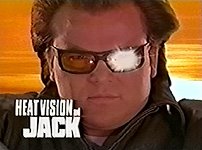by David Scott (based on a story by God)
Note: I'm a big ol' liberal, so I just want to point out, I'm laughing at myself. ;)
Once upon a time, in a land that would eventually be coveted for its oil-rich resources and strategic proximity to the Holy Land, there lived a man named Job. This man was enlightened, a free-thinker, empathetic, and always took the care to recycle. He had the utmost respect for Mother Nature, or as She was often known as: God or Goddess, depending on what gender aspect S/He decided to honor on any particular day.
Thanks to herbal fertility supplements, Job's wife had seven sons and three daughters. Although Job, the designated sperm donor, could not possibly understand the pain, suffering, and toil that was involved in carrying TEN freakin' children to term, he still managed to honor the Goddess within by handling the domestic duties involved in maintaining their home, thus setting a nontraditional example to others in the their land. It was the LEAST he could do.
Job owned the largest free-range, cruelty-free ranch in all of the land. He maintained a carefully balanced, symbiotic relationship with the earth and all the thousands of living things that called the land home. Job also had many employees, all of them enjoying a living wage, with health, dental, a 401k plan, and stock options. On Friday, they had Hawaiian t-shirt day.
His sons would often take turns holding celebrations and self-improvement workshops in their own homes, and they would invite their sisters to eat baked tempeh and falafel, to atone for the gender disparity. There they would indulge in a glass of antioxidant-rich red wine, which, in moderation, had been touted for its health benefits, or perhaps a cup of soy milk, if they were feeling adventurous.
One day a multi-cultural multitude of angels, representing every race, gender, and sexual orientation came before Goddess to perform lesbian protest haiku, which Goddess always enjoyed. It was Her second favorite thing, right after Ani DiFranco albums. The Adversary, or Dick Cheney, which is the direct translation from the Hebrew, arrived with them. They did not mind this as they realized that inside, Dick Cheney was a lost, litle boy who needed love and acceptance.
"Namaste, Dick!" Goddess greeted with love. "Where have you been lately? I was beginning to worry. The cheribum have been nervous. You never write, you never call..."
"Oh, I was out doing my thing...Strengthening the military-industrial complex, cutting funding for the poorest among us, making inappropriate homophobic comments. You know, the usual," Dick Cheny responded.
Goddess sighed and shook her head. "I sense great pain in you Dick. The longer you hold on to it, the more it will keep you seperated from the bliss of All That Is."
"That gets less inspiring every time you say it," Dick sneered.
"When I need inspiration, Dick, I always find it in nature. I mean, have you seen Job? Here is an individual who truly lives in the light and is always in touch with his true, authentic self. He always embraces positivity and good. Maybe he has a lesson which you could benefit from?" Goddess smiled encouragingly.
"You're kidding right?" Dick said with a smirk on his face. "Oh, this guy's living in the light all right, the light coming off of his new iPod. C'mon, it's easy to be positive when you go to bed each night, snuggling in between your 1000 thread count sheets and reading Deepak Chopra under the soft glow of the newly installed track lighting! Job's never known a day of true pain in his whole life. You take away everything he has and I'll give you another red-state voter."
"Okaaaay," God said doubtfully (for He had switched to his male aspect so as not to marginalize the male angels in His company.) "While I don't agree with your viewpoint, I want you to realize I respect and honor it. I hope that by embarking on this learning experience, it will bring about positive chance within you." God paused. "Just don't kill him, Dick."
"Why the hell would I do that?" Dick responded, somewhat bemused. "How would that help me win my arguement? Just killing the guy?"
"I just wanted to make sure--"
Dick pointed his finger towards God. "You. Are weird." Then he turned into a giant winged monkey and flew away.
One day, when Job's sons and daughters were holding their harmonic concordance festival, a messenger came to Job, looking quite panicked.
Job started to feel his pulse quicken and a sense of dread racked his body. "We're not out of tofu, are we? Goddess, out with it!"
"It's worse, Job," the messenger said between breaths. "The oxen...the sheep... the beavers... They've been captured by Procter and Gamble! They're going to test their cleaning products on them, despite there being many cruelty-free alternatives to animal testing!
"Good Goddess!" Job exclaimed. "When did we get beavers?"
"Oh, Job, they're being murdered for their pelts. And what's more, your assitants... your assitants, Job..."
"They're being tested on by Procter and Gamble?"
"No, no, worse. They've formed a Young Republicans Club."
Job shook his head in disbelief. Then he looked squarely in the messenger's eyes. "We must be strong. Everything happens for a reason. I'm sure this will turn out for the best. After all--"
Before he could finish another messenger ran over and interrupted, in an urgent, but respectful way. "Um, excuse me, Job? Sorry to interrupt your wise speech, but I have to let you know that do to excessive use of chlorofluorocarbons, there is a hole in the ozone layer the size of Fleetwood Mac. I'm talking about all their members stretched from one end to the other. Through it, dangerous ultraviolet rays have given the donkeys skin cancer. I'm sorry, Job."
Job sighed and looked bewildered at all of this bad news. Still, he made an attempt at holding it together. "That's truly awful, my friends," he said weakly. "Perhaps we can start a petition, write impassioned letters to the editorial pages..."
Before he could finish, yet another messenger ran up to him. Job started to tremble. "Job, you need to sid down, old friend." Job pulled up a rock and the messenger kneeled before him. "I'm afraid I must tell you that your children have left this world, Job. They have ended one chapter and started another one, leaving us to continue on in this world."
"You mean... you mean they're dead?" Job stammered.
"As a doorknob, Job. They were burning something...incense, a sage stick perhaps, to clear the energies. That's when the fire began. If only the house had been up to code, Job, if only--" The messenger began to sob.
"There, there," Job said, trying to comfort through his own tears.
"IT HURTS SO MUCH, JOB!" the messenger wailed.
They hugged it out. Fifteen minutes later, they let go and Job said, "Did...did anyone survive, old friend?"
The messenger's face lit up. "Yes! Why yes, Job! Little Mandy made it out of the fire! Only one year old and she crawled out of there, the plucky little thing. Isn't that great, Job?" They both started to laugh.
Just then, Dick Cheney, in the shape of a large eagle, swooped down, picked up little Mandy in his talons and dashed her upon the rocks.
There was much wailing from Job and his three messengers. Job ripped his clothes off, gnashed his teeth, and pulled out his hair. "This...is...a...really...BAD...DAY!!!" Job shouted. Then he felt a calm wash over him. "But somehow, being naked makes it better. I will live in this moment with a grateful heart. I surrender my heart ot the love of Goddess! Blessed be!"
"Wow," Goddess sniffed. "That's just so moving. It needs music. When he says 'Blessed be,' the choirs should just swell. I'm telling you."
The angels murmured in agreement. Dick Cheney crossed his arms, perturbed. "I know what this
really needs," he said in a sinister tone.
"Oh, Dick, you've been practicing your sinister tone! That's really quite good," She praised. All the angels clapped politely. "Really 'grrr,' scary. You have so many talents, big guy!" She beamed at him proudly.
"You're not even listening to me," Dick said sullenly. "You never listen to me!"
Goddess' back was turned talking to a group of angels. "I love Shakira!" she cooed, before turning around to face Dick. "Oh, I'm sorry, Dick," She said contritely. "What were you going to say? What does this
really need,"she said, echoing Dick's sinister tone.
Dick stood there pouting. "I don't want to tell you now."
"Come on. I really want to hear."
"No, no, it's ruined."
"I was listening. I'm omnipotent. I hear everything!"
"Forget it!" Dick started to walk away in a huff.
"Please, Dick," Goddess implored. "I promise to truly, actively listen."
"Okay, okay," Dick said, his grin spreading. "This really needs... BOILS!!"
"Again with the boils!" God said, switching back to the masculine. "You know that's your solution for everything."
"Never underestimate the power of a good boil," Dick responded.
"Maybe...and this is going to sound crazy...maybe you should try encouragement, kindness, and love instead of fear and hate."
Dick put his hand to this chin and looked thoughtfully up at a cloud. "No, no, I think I'd like to just try the boil thing. Unless you think that my somewhat nontraditional viewpoint is in someway less valid than yours..."
God looked aghast. He pointed his holy finger at Job (index, for the curious). "Don't think I don't know what you're doing..."
"I'm just sayin'..."
"All right, all right, I'll give you another chance. I just sincerely hope you realize that I'm doin this for you, Dick. Because...I love you." God raised his hands up. "There, I said it and I feel better. And deep down inside I know you love me too."
"You. Are weird." Then Dick Cheney turned into a giant winged monkey and flew away.
That night Dick Cheney replaced Job's eco-friendly, non-toxic, organicaly made soap with a bar of Zest, made by Procter and Gamble. Job, being somewhat distracted by his recent losses didn't notice and used the bar to cleanse his entire body before going to bed.
The following morning, Job awoke in the monstrous shape of a cockroach. Which turned out only to be a misguided literay allusion. Then he woke up again, his body racked with geysers of pain. He was covered in boils. "Did you replace the soap?" he yelled to his wife, who was in the other room.
"No, why?" she asked, walking in. As soon as she saw him, she screamed. "GOOD GODDESS!" Then she composed herself, not wanting to hurt his feelings. "Ummm, that's a...that's a new look for you," she chirped unconvincingly.
Job began to cover himself in garbage.
"Oh, Job," she sighed. "Truly things are bad. You know there is always the option of euthanasia. Perhaps you are meant to move on and help the planet by depopulating it by one."
"Dear heart," he answered. "I don't mean to criticize or demean your point of view in any way, but I sincerely think that I need to honor Goddess by living in the sacred spirit. Maybe then I will find enlightenment.
"Yeahhhhhhhh," she said and walked out.
Job's three friends, Eli, Bill, and Zoe, all of varying ages, genders, races, and sexual oreientation, came over to comfort him. When they saw him, they were much repulsed and began to weep. They ripped off their clothes. "That is so sad," they all seemed to agree, "but somehow, being naked makes it better." Then they formed a healing circle and began to sing R.E.M.'s "Everybody Hurts."
After the third encore, Job found himself in serious need of a professional counselor specializing in grief and boil therapy. "I'm feeling less than abundant right now," he admitted, shakily. "Truly, the thought of divinity seems like some sort of illusion that I've wasted my life chasing all this time. I am alone in the universe."
The three friends gasped in unison. "Whoa there, friend," Eli said compassionately. "That's just stinkin' thinkin'."
"Yeah, Job," Bill chimed in. "I know you're having a spiritual challenge right now, but let's not talk crazy."
"I'm not crazy!" Job spat. "My baby girl got smashed on the rocks by a devil-bird!"
"Oh, Job," Zoe piped. "If only you could see the negative energy coming off of you right now. It is like seriously affecting my vibration. I can't even see your heart chakra right now. It's like...you don't even have a heart. Man, that's creepy."
"Oh, so now I'm heartless...and creepy!" Job wailed.
"Wow, he is gone," Zoe murmured to Bill and Eli, who nodded in agreement. "Cuh-ray-zee," Bill sung.
"Well, Job," Eli asid. "It's like you have told us before. Like attracts like. If you're having negative thoughts, you're bound to attract negativity. You create your own reality."
"So you're blaming me?" Job asked, incredulously. "Don't you understand? It's me! I'm the most positive person in the world. I WAS the most positive person in the world. And weird, terrible crap still happened to me. I had nothing but pure thoughts of love and abundance. I was connected to the Infinite Source!"
"Think hard, Job, are you sure you didn't have any negative thoughts, perhaps even on the subconcious level? Something you're not even aware of?"
"How the hell am I supposed to know that? If it's subconscious, I'm not conscious of it, now am I?"
"Hoo boy, we need to clear his chakras," Zoe whispered to Eli and Bill. "Let's hold hands and form a chain." They turned back towards Job and Zoe began to loudly enunciate. "We're going to hold hands and form a chain, Job!"
Job backed away, shaking his head violently. "I don't want to hold hands! Life sucks! And have you watched Jay Leno lately? It's like he's not even trying!"
Realizing that Job was in a negative space and filled with dark energy, the three friends decided to leave and just psychically send him thoughts of love and healing. Just then, Eli's younger sister, Elly arrived. They told her the whole ordeal, which made Elly very sad.
"You guys," she admonished. "I know Job is in a dark place, but he doesn't need to hear words of discouragement!"
"Job," Elly said, walking towards the corner where he had curled up into the fetal position. "I know I'm just a teen and I haven't read all of the spiritual books that you have, but hear me out. I respect you so much. I've always looked up to you and thought, wow, that guy's got it together." Job grabbed his sleeve and blew his nose into it, loudly. "Listening to you," she continued, "you taught me that we are always connected to Source and that nothing can truly break that. You can choose to ignore that connection, but it cannot be broken. You can deny your divinity and your spirit, but you cannot eradicate it. YOU taught me that Job. You. Goddess is everything including the pain of the boils and the wings of the devil-bird that carried off Mandy. Everything that is, IS. The danger in life is to deny death. Because when you deny death, you deny life. And when you deny life, you deny yourself. And when you deny life, you deny---I'm sorry, where was I?"
"You lost me," Job said, confused. "Pain of boils, then something else... It was helping though."
Just then Goddess appeared in the shape of an enchanted water cooler. "Job," the voice echoed with majesty through the room. "It is I. The Source of all things. I have something important to tell you."
Everyone in the room gasped in awe. "A...talking...water cooler!" stammered Job.
But first, drink of me, everyone, for my water is pure, fresh from the springs of heaven, and free of chemicals and additives."
They all made an orderly line and filled their cups and drank of Her, and it was truly refreshing. It made them all seriousl renew their desire to clean up and protect earth's water sources.
"Thank you for the water, Goddess," Job said. "But I still cannot help but feel like a lost child in a 24 hour Wal-Mart. That is on fire. And all the doors are locked." Everyone frowned at the simile. "Why do you torture me so," Job wailed, his voice cracking.
Goddess turned into her human form and sighed heavily, for Job's plight was truly pathetic. She sniffed and magically created a box of Kleenex with which to blow her nose.
"Oh Job," she said. "Take a look around you. Look at the earth. The stars. All the wonderous creatures. Birds. Ice Cream. Anal sex. I created them all."
Job looked at her, somewhat confused. "And your point is..."
"Oh, Job," she said, turning away. "It's just...it's just... I worked SO hard on the, what do you call it, the universe. And...and..." Goddess began to cry. "I just, I don't know, I thought you might be a little grateful, that's all." With that she began to bawl.
"Hey, uh, hey," Job said tenderly. "I...it's not that I'm not grateful, it's just that..."
"I mean, do you know how long it takes to create a constellation? That's a lot of heat, Job. And then to put them into interesting shapes... I didn't have to do that you know. But I just wanted it to be... I wanted it to be special. For you, Job. I wanted it to be special for you."
At this, Job began to weep copiously. "Oh, Goddess, I'm sorry. I was truly being self-serving. I had my own human interests at heart and wasn't even validating the intrinsic spark of the divine that exists in everything. Please forgive me!"
Goddess smiled great big through her tears and they embraced, which was somewhat awkward for Job because he was afraid that the hug might be misconstrued in a sexual way.
After that, Job got together with his friends and formed a healing circle. Zoe cleared his chakras using a set of very powerful crystals and they all agreed to intend only positive things. Then they all played Scattergories.
Goddess blessed Job, returning the imprisoned animals back to the land where he nurtured them back to health, but not before taking pictures of their horrible mistreatment to use in PETA literature. Also, him and his wife decided to adopt a litter of crack babies, rather than to add to the already increasing overpopulation problem.
And so it was that Job and his family lived and prospered, taking comfort in being connected with the Source that is Goddess, and delighting in a state of abundance and love.
Dick Cheney eventually came to terms with his homosexuality, entering into a committed relationship with Gabriel. Job, and his family and friends held a coming out party and welcomed into their circle of love.








